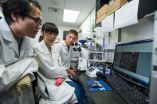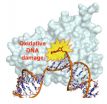Researchers shed new light on the genetics of memory performance
2014-11-25
(Press-News.org) (Boston)-- In the largest study of the genetics of memory ever undertaken, an international researcher team including scientists from Boston University School of Medicine (BUSM), have discovered two common genetic variants that are believed to be associated with memory performance. The findings, which appear in the journal Biological Psychiatry, are a significant step towards better understanding how memory loss is inherited.
Longer life spans and the increased prevalence of memory impairment and dementia world-wide underscore the critical public health importance of efforts aimed at deciphering the underlying mechanisms of human memory.
The Cohorts for Heart and Aging Research in Genomic Epidemiology (CHARGE) consortium was developed to facilitate the study of the entire genome through pooling of data from research centers all across the world. Nearly 30,000 participants who did not have dementia were included in the study. Each participant completed memory tests, such as word recall, and their entire genome was genotyped. Using sophisticated statistical analysis, the genome was examined for segments that were associated with low memory scores.
The researchers found genetic variants near the Apolipoprotein E gene, known to harbor an increased risk of dementia (especially Alzheimer disease), were associated with poorer memory performance, mostly so in the oldest participants and for the short story recall. In a sub-study with post-mortem brain samples, participants with an increasing load of memory risk variants also had more pathological features of Alzheimer disease, perhaps reflecting in some instances early pre-clinical stages of the disease.
According to the researchers two additional regions of the genome, pointing to genes involved in immune response, were associated with the ability to recall word lists, providing new support for an important role of immune system dysfunction in age-related memory decline. "Interestingly genetic variants associated with memory performance also predicted altered levels of expression of certain genes in the hippocampus, a key region of the brain for the consolidation of information. These were mainly genes involved in the metabolism of ubiquitin that plays a pivotal role in protein degradation," explained lead author Stéphanie Debette, MD, PhD, adjunct associate professor of neurology at BUSM.
This unprecedented world-wide collaboration has generated novel important hypotheses on the biological underpinnings of memory decline in old age, however the researchers caution that more research is clearly needed to confirm these findings. "The differential associations according to memory test characteristics and age should be accounted for in future studies. Exploring other types of genetic variation, including rare variants and epigenetic modifications, will be crucial to decipher the full spectrum of memory heritability," added Debette.
INFORMATION:
This study was funded by the National Heart, Lung and Blood Institute's (NHLBI) Framingham Heart Study, the National Institute of Neurological Disorders and Stroke and the National Institute of Aging (NIA) AG033193, 081220 and U0149505 (Seshadri) and NHLBI HL096917 (Mosley).
ELSE PRESS RELEASES FROM THIS DATE:
2014-11-25
BUFFALO, N.Y. - A new hybrid vehicle is under development.
Its performance isn't measured by the distance it travels, but rather the delivery of its cargo: vaccines that contain genetically engineered DNA to fight HIV, cancer, influenza and other maladies.
Described recently in the Proceedings of the National Academy of Sciences, the technology is a biomedical advancement that could help unleash the potential of DNA vaccines, which despite two decades of research, have yet to make a significant impact in the treatment of major illnesses.
"The technology that we're developing ...
2014-11-25
There has been much recent debate on the benefits and risks of screening for breast cancer using BRCA1 and BRCA2 mutations in the general adult population. With an estimated 235,000 new breast cancer diagnoses each year in the U.S. and more than 40,000 deaths, it is clearly important to be able to determine which women may be genetically predisposed to breast cancer.
Glenn E. Palomaki, PhD, associate director of the Division of Medical Screening and Special Testing in the Department of Pathology and Laboratory Medicine at Women & Infants Hospital of Rhode Island has ...
2014-11-25
This news release is available in German.
Wireless data transmission largely takes place via WLAN networks, such as WiFi. However, these networks are currently limited to high frequency ranges at 2 GHz and above and, hence, have a limited range. The authors of the study, Arnd Weber of the Institute for Technology Assessment and Systems Analysis (ITAS) of KIT and Jens Elsner, a former member of the staff of the KIT Communications Engineering Lab, propose to extend the frequencies for free communication to include lower ranges and even increased transmission power. ...
2014-11-25
A higher surge of testosterone in competition, the so-called "winner effect," is not actually related to winning, suggests a new study of intercollegiate cross country runners.
The International Journal of Exercise Science published the research, led by David Edwards, a professor of psychology at Emory University, and his graduate student Kathleen Casto.
"Many people in the scientific literature and in popular culture link testosterone increases to winning," Casto says. "In this study, however, we found an increase in testosterone during a race regardless of the athletes' ...
2014-11-25
Anglers across the nation wondering why luck at their favorite fishing spot seems to have dried up may have a surprising culprit: a mine miles away, even in a different state.
Scientists at Michigan State University (MSU) have taken a first broad look at the impacts of mines across the country- and found that mining can damage fish habitats miles downstream, and even in streams not directly connected to the mines.
The work is published in this week's issue of the journal Ecological Indicators.
"We've been surprised that even a single mine in headwaters might influence ...
2014-11-25
Australian average incomes are falling with the country's population growth "masking underlying economic weakness", according to a QUT economist.
Dr Mark McGovern, a senior lecturer in QUT's Business School, said while it was regularly proclaimed Australia had experienced positive economic growth for more than 20 years, there had been periodic per capita declines, indicating the economy was not as healthy as assumed.
"Looking at national income figures in recent years shows our economy is under stress," Dr McGovern, whose research was recently published in the Economic ...
2014-11-25
Few agribusinesses or governments regulate the types of plants that farmers use in their pastures to feed their livestock, according to an international team of researchers that includes one plant scientist from Virginia Tech.
The problem is most of these so-called pasture plants are invasive weeds.
In a Proceedings of the National Academy of Sciences study this month, the scientists recommended tighter regulations, including a fee for damage to surrounding areas, evaluation of weed risk to the environment, a list of prohibited species based on this risk, and closer ...
2014-11-25
Using a new imaging technique, National Institutes of Health researchers have found that the biological machinery that builds DNA can insert molecules into the DNA strand that are damaged as a result of environmental exposures. These damaged molecules trigger cell death that produces some human diseases, according to the researchers. The work, appearing online Nov. 17 in the journal Nature, provides a possible explanation for how one type of DNA damage may lead to cancer, diabetes, hypertension, cardiovascular and lung disease, and Alzheimer's disease.
Time-lapse crystallography ...
2014-11-25
PHILADELPHIA (Nov. 25, 2014) - As the linked epidemics of obesity and diabetes continue to escalate, a staggering one in five U.S. adults is projected to have diabetes by 2050.
Ground zero for identifying ways to slow and stop that rise is Philadelphia, which has the highest diabetes rate among the nation's largest cities. For public health researchers at Drexel University, it is also a prime location to learn how neighborhood and community-level factors -- not just individual factors like diet, exercise and education-- influence people's risk.
A new Drexel study published ...
2014-11-25
PITTSBURGH, Nov. 24, 2014 -Barriers to the sharing of public health data hamper decision-making efforts on local, national and global levels, and stymie attempts to contain emerging global health threats, an international team led by the University of Pittsburgh Graduate School of Public Health announced today.
The analysis, published in the journal BMC Public Health and funded by the Bill & Melinda Gates Foundation and the National Institutes of Health (NIH), classifies and examines the barriers in order to open a focused international dialogue on solutions.
"Data on ...
LAST 30 PRESS RELEASES:
[Press-News.org] Researchers shed new light on the genetics of memory performance





